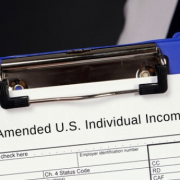Six Things Every Homeowner Should Know About Property Taxes
 You might not have factored in property taxes when planning to buy your dream home – but the cost of homeownership goes beyond your mortgage payment.
You might not have factored in property taxes when planning to buy your dream home – but the cost of homeownership goes beyond your mortgage payment.
It’s important to discover how your property tax bill works – once you know how it’s calculated, you can challenge it if you feel it’s too high. Additionally, property taxes can be a valuable write-off and as a homebuyer, you should take advantage of all of the available tax breaks for homeowners.
Here are six things every homeowner should understand when it comes to property taxes.
You Might Need To Pay Different Types Of Property Taxes
Home property taxes include your annual assessment and direct assessments, which are flat fees for specific services such as street cleaning or landscaping. Some localities also impose special assessments to pay for a specific project, like a new park or library. When you’re buying a home, research how much its property taxes are – including direct and special assessments – so you can budget for your future as a new homeowner.
A Tax Assessor Calculates Your Property Tax
To calculate property tax, the tax assessor attaches a property value to your home and makes adjustments based on local rules to determine the assessed value. For example, your county might calculate property taxes based on 20 percent of your home’s assessed value so the county assessor would multiply the fair market value of your home by 20 percent to determine the assessed value.
The assessor divides the assessed value by 1,000 and then multiplies that by the mill rate – the number that represents the amount per $1,000 of the assessed value of the property – to calculate your property tax bill. For example, if the mill rate is seven and your home has a taxable value of $150,000, your property tax bill would be $1,050.
Property tax rates vary depending on where you live. It’s important to know that your tax bill might increase if you’re adding additional square footage to your home, because completing construction on a renovation could increase your home’s value.
Propety Tax Due Dates Vary
Property tax due dates vary depending on where you live. Some counties require you to pay the annual property tax bill in one payment and others break it up into two installments. If you receive two tax notices, don’t assume the second one is a duplicate bill.
Different states and counties accept various forms of payments. For instance, some allow you to pay property taxes with a credit card online; if you pay by card, you’ll likely have to pay a convenience fee equal to a percentage of your bill.
If you have a mortgage, you might pay an extra amount each month into an escrow account, which the bank uses to pay property taxes on your behalf. For example, if your annual real estate taxes are $1,200, you would pay an extra $100 on your mortgage each month. Consider the fees before paying property tax online with a credit card, because it could end up costing you more than what you’d earn in credit card rewards.
You Can Be Subject To Interest And Penalties For Not Paying Property Taxes
If you don’t pay your property taxes on time, you could owe interest and penalties. If you continue to be delinquent, the government could put a tax lien on your home or foreclose on it and sell it to generate cash to pay your bill.
If you have a lien on your home, any proceeds from a sale go first to pay off the delinquent taxes. Sometimes your mortgage lender will pay the property taxes on your behalf and request reimbursement from you. If you don’t pay the money back, your lender might consider you in default on your mortgage and foreclose.
You Might Be Eligible For Property Tax Relief
Governments often offer special property tax relief to certain groups like veterans, the disabled and those who have lived in the same home a long time. The exemptions don’t reduce your tax rates – instead, they lower the assessed value of your home.
You can also challenge the property tax assessment through the tax collector’s office. For example, if you believe your tax bill is too high because the assessed value of your property exceeds its actual value, you can submit evidence of that to the tax collector. If you win your appeal, your property tax bill will be reduced.
You Can Deduct Property Taxes From Your Federal Income Taxes
If you itemize your deductions on your federal income tax return, you can deduct the amount of property taxes you pay but you can’t deduct the cost of special assessments. If you pay your property taxes through an escrow account, you can deduct only the amount that actually went to the government, not the total amount you paid into the account.
Source: Miami Herald

